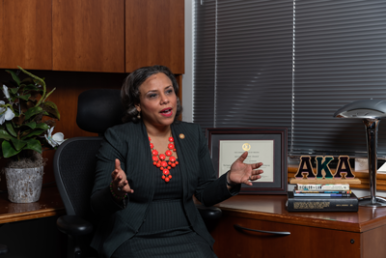Disrupting racism
Janice Underwood leads the state’s efforts to create a more equitable culture
Kate Andrews //January 29, 2021//
Disrupting racism
Janice Underwood leads the state’s efforts to create a more equitable culture
Kate Andrews //January 29, 2021//
In the months after a blackface scandal threatened his governorship, Gov. Ralph Northam announced that he would appoint a chief diversity, equity and inclusion officer who would report directly to him — the first Cabinet-level position of its kind in any state in the nation. In September 2019, Janice Underwood took on the challenge.
A longtime educator who taught in Hampton’s public schools before leading Old Dominion University‘s Teacher in Residence program and then serving as ODU’s director of diversity initiatives, Underwood has led the creation of the strategic One Virginia Plan to address systemic racism and inequity throughout state government and create more inclusive practices. She also leads the COVID-19 health equity task force for the state and has participated in high-level discussions at Virginia Military Institute, which is undergoing a reckoning with what some Black cadets have called a “relentlessly racist” culture.
Although her position was born during political turmoil, Underwood says that far from being “just the window dressing,” she is engaged in “institutionalizing equity so that it can be deeply embedded — to confront the inequity that’s also deeply embedded.”
If anything, her job has become even more urgent during the past year, with the combination of COVID-19 and the economic downturn disproportionately affecting people of color. Also, nationwide protests following the police killings of George Floyd and Breonna Taylor have shined a spotlight on structural racism, which Underwood says she is working furiously to interrupt.

Virginia Business: What are some lessons you’ve learned during your career?
Janice Underwood: As a Black leader, I know about racism. Sometimes when you join with people who are allies in this work who aren’t Black, you got to make sure people understand that we’re in this together, but I’m also a victim of it as well. I’ve experienced it. You’ve got to have cultural humility, because you haven’t walked in my shoes and you’ve only read about it or heard about it, or maybe saw it from a distance because you have a relative who’s Black, or a friend.
What I’ve learned is there are a lot of people who say they are allies in this work and who believe they are DEI [diversity, equity, inclusion] champions, but also don’t understand how they undermine the work because they believe that they are such champions and aren’t willing to interrogate this lifelong learning.
I think Robin DiAngelo
says it best when she says structural racism isn’t an event, it’s a system — and that’s big. Structural racism is not an event, it’s a system that we all have been socialized under and lived under.The one thing that I’ve learned … is that the learning is never over, and no one ever arrives at this complete understanding. Sometimes even Black leaders don’t always have the language to express what it is we’re feeling.
VB: How can workplaces even the playing field?
Underwood: The first thing that you’ve got to understand is that pointing your finger at someone and calling them a racist never gets you anywhere. It’s not always what you say, but how you say it. It’s about how you make people feel. If I make you feel like a worthless racist because I’m name-calling you a racist, then we’re not going to get anywhere, because all it’s going to do is make you defensive.
Racism and inequity have had a 401-year head start. It’s going to take people working together almost in stealth mode to create what I like to call an underground railroad. If you have an intentional strategy where you get different people at different levels of the organization and find out who your allies and accomplices in this work are, we can begin to have everyone talking about diversity, equity and inclusion in a certain way.
Everyone doesn’t need to know who all your allies are. I’ve got so many hidden allies around the state [and] in the nation.
I think you need to make the business case for diversity, equity and inclusion, and it’s really about not just feel-good changes. It’s about interrupting systems of oppression, and there’s a business case for it. There’s a return on investment for these initiatives, both economically in terms of profit, in terms of even saving organizations money with regard to recruitment and retention, but it’s also a social and cultural return on investment, like psychological safety and sense of belonging. I’m expected, empowered to raise my voice, to add my voice.
When we can get to that place, that’s when we’ll see real diversity and inclusion. That’s when we’ll see the return on investment.
VB: How can businesses remove pressure from Black employees, when people are constantly looking to them for answers to solve equity and diversity issues?
Underwood: You have to stop asking Black people to solve something we never created. We didn’t create structural racism; we didn’t create slavery. Why are we being the ones asked to fix it? We understand it. We know what it feels like.
It’s going to take people that look like Gov. Northam to use their influence, to say, “Listen, I had an incomplete understanding of what racial oppression looked like. I’ve heard about it, I read about it. Now I understand because I’ve taken the time to listen.” My advice would be: Do a lot more listening first to people and understand what the actual issues are, because we still don’t even have a clear understanding or appreciation for what the problem is.
Some people don’t even agree that racism still exists. Some people are in this weird vortex and think we live in a post-racial society. “We’ve had Barack Obama; now we have Kamala Harris; we couldn’t possibly have racism anymore. We certainly don’t need a Dr. Janice Underwood in the state of Virginia.”
VB: When you were approached about taking this job after the governor’s blackface controversy, did you have any reservations?
Underwood: We were all taken aback by the events of February 2019, but simultaneously our commonwealth was reckoning with the 1619 commemorations. Remember, I said structural racism is not an individual incident — it’s a system that allows those individual incidents to occur.
I remember thinking [while] sitting at Fort Monroe in August during the 1619 commemoration, “I’m about to take on this role, and I feel the weight of the ancestors on my shoulders.” This is an opportunity to serve those who never had a voice and to serve those who are currently being oppressed and/or serve those who have yet to exist, to make the world a better place, to actually work toward liberty and justice for all.
They vetted me in several interviews. They asked me lots of questions in panels [and] individual interviews, but at the same time, I was vetting them. I was interested; I was learning. Were they good enough for me? Because I know what I bring to the table, and I know what kind of work ethic I have. I know that I have a plan to interrupt racial oppression, as opposed to just [being] the window dressing.
Do I want to provide that? Do I want to commit to this administration?
That dance, that very well choreographed dance, happened early on in the summer of 2019, and it was an honor for me to get to know Gov. Northam because I report directly to him.
We have the honor of saying that we are the first state in the nation to have this position. House Bill 394 in 2020 codified it as a permanent position for every future [gubernatorial] administration. That’s a win. We’re not going to interrupt all systems of inequity in our time here, but this will live on. We’re institutionalizing equity so that it can be deeply embedded to confront the inequity that’s also deeply embedded.
VB: What is the state doing to assist Black entrepreneurs so that they have better access to fair bank loans and get the resources they need for their businesses to flourish?
Underwood: In 2020, state Sen. Mamie Locke patroned a bill to limit the predatory loans, which we know have ravaged low-wealth communities. We know those low-wealth communities are rural communities, as well as communities that are largely African American or Latino. Then COVID-19 occurred, [and we] created the small business Rebuild VA program. We fully funded it, and it absolutely took off.
We organized [Rebuild VA] so that it would not function in the same way our Paycheck Protection Program did at the federal level. Minority-owned businesses, a lot of them very small, couldn’t even get access to those federal loans and those grants. We set aside priority for Small, Women-owned and Minority-owned-certified businesses in Virginia. The Department of Small Business and Supplier Diversity, under the leadership of Tracey Wiley, really championed this idea of making sure that everybody had access.
Now the work goes on. The work has to go on, because if I can just be candid with you, economic inequity is at the root of what we’ve seen historically and contemporarily. We used to have a Black Wall Street in Tulsa, Oklahoma. It was one of the most prosperous African American communities in the United States. There was so much intentional creation of this powerful Black community, [and] it was attacked. It was burned to the ground. Independence was seen as a threat to the white-dominated American capitalism system.
What we need to understand is those historical antecedents made Black business owners today vulnerable, and we are living off of that history. Black businesses aren’t given the same access to capital.
What we do know is that Black businesses couldn’t access the PPP loans. These larger businesses had the wherewithal and the lawyers and the access to the banks, [and] because we don’t have the capital, we literally couldn’t access the banks to help us with this.
All of these things are at the top of my mind and many of my colleagues’ [minds] in the Cabinet. We’re trying to interrupt not these individual instances but the systems that allow these instances to just flourish and be perpetuated.
VB: Although there’s so much attention on these issues right now, how do you encourage long-term support and investment once the headlines start to fade?
Underwood: This idea [that] people in my position are only needed when there’s a crisis — those well-intended “DEI champions” don’t realize they’re undermining the work we started. They are often not even convinced that they have undermined any work until they hit their own crisis. Then they call people like me.
But I don’t want to be viewed as the diversity police. It gives people like me a bad name, and it actually does more just to destroy the legitimacy of the field. There is an electorate of people who want to return to ignoring white supremacy in plain sight. There was this idea that when George Floyd was murdered, a 21st-century manifestation of a lynching in front of all of our eyes, it was like, “Could we please stop talking about it?” People said, “OK, enough already.”
And there were others saying, “We don’t want to stop talking about this. It’s uncomfortable for us to have to keep talking about this.” In fact, the people who want to keep talking about this, we’re the ones that are accused of being the racists.
“Dr. Underwood, you talk about race too much. Dr. Underwood, the only reason we have this problem is because you’re talking about it; you’re making us talk about it.” As if I lived in 1619 and owned 29 slaves, or I was Thomas Jefferson that made these comments in our Declaration and yet still had children with Sally Hemings.
You do as much work as you can to interrupt systems of inequity and make sure everyone’s talking about it in the same way. How we talk about what we do is just as important as what we do.
VB: What are your plans for 2021, Gov. Northam’s final full year in office?
Underwood: Well, right now my head is down, and I’m doing the work. We have 10 agencies in state government who are ready to launch a diversity strategic plan that they’ve never done before.
I literally don’t know what’s next. I’m hoping that I’ll be able to pay my mortgage, but I don’t know what’s next. Getting my husband to understand that, he’s nervous, saying, “Come on. We got to figure out a plan.” I don’t have a plan. I’m really being led by the spirit that guides me, my intuition that guides me, and right now my intuition says, “Keep your head down, do the work, and do it with excellence. Operate with excellence, and that excellence will be rewarded.”
VB: You come from a higher education background and have been involved with the conversations around race at VMI during the past few months. What do you think about that process?
Underwood: I want to start by saying that I’m really proud of the VMI Board of Visitors, the work that they’ve done, and the progress that they’ve made. I’m really excited about the appointment of Maj. Gen. Cedric Wins [as interim superintendent]. I’m really excited about the messages that they are sending, that they are speaking in one united loud voice, that Black lives do matter, that this idea of the historical antecedents that brought us to this place are not the values that they espouse.
These are conversations that everyone should be having — not just VMI. I’ve been a proponent that we need to make all of our institutions of higher education — public, private, four-year and two-year — inclusive and really edified with the framework of inclusive excellence. That’s the model I believe in, and it’s the model by which I’m creating a diversity strategic plan for all state government.
It’s called the One Virginia Plan because I believe that while we are many Virginians, we are one commonwealth. As trite as it sounds, there is more that unites us than divides us.
Related Articles
Talking shop
Black entrepreneurs, especially women, face extra challenges
Leadership lessons
Black business leaders offer wisdom, advice for next generation
l



















